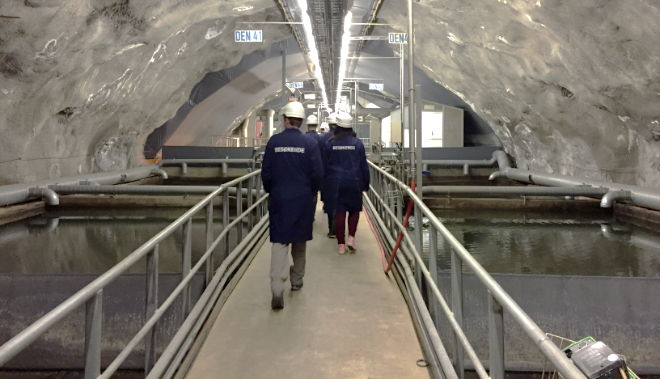KJM1700 Environmental and climate challenges
The course provides a basic scientific introduction to the environmental challenges and several of the UN's sustainability goals, and how environmental authorities use scientific insights. A group project assignment provides an in-depth look at a chosen environmental theme and training in scientific publishing. The course has an interdisciplinary approach that makes it suitable for students from other disciplines who need basic knowledge of the environment and climate in the academic community.
BIOS3070/KJM3070 Biogeochemistry
The global environment is tightly linked to the global cycles of carbon and other key elements like nitrogen, phosphorus and iron. These elements are also closely related to the hydrological cycle as well as biological production, diversity and ecosystem services, and chemical properties of the environment. The course will focus on couplings between biological, geological and chemical processes, on the interactions between climate and the environment, and human impacts on these processes.
The lectures are common for the courses KJM3070 and KJM4070 while most of the colloquia, workshops and labs are being held separately.
TFF3219 Cross-disciplinary ecology in the Anthropocene
Anthropocene, the age of humans, is suggested as the name for the geological epoch that we are currently in. Humans are seen as the most important force in the large changes that can be observed in climatic patterns, atmosphere, biodiversity, cryosphere, seas and lakes. IPCC has stated that the climate change is caused by anthropogenic activity, indicating a new link between humans and nature.
This implies a cross-disciplinary challenge for any scientific discipline, from humanities and social sciences to biology, geology and other natural sciences. With the cross-disciplinary research project ECODISTURB as our starting point, this course provides an opportunity to understand and discuss the cross-disciplinary challenges arising in the Anthropocene.
GEO4161 Contaminants in the geoenvironment
Contaminants in soils and ground water pose a threat to our society and the limited land and water resources. The course will cover:
- Types of contaminants, both organic and inorganic
- Physical/chemical distribution among phases/media
- Biogeochemical processes in soils and groundwater
- Transport of contaminants
- Risk assessment
- Natural attenuation
BIOS4500 General Toxicology
The course will cover basic toxicology and ecotoxicology, including how toxic substances are taken up in the organisms, distributed, biotransformed and excreted, how toxic substances react with biomolecules and downstream consequenses for the organism, as well as knowledge about toxic substances, e.g. metals, organic contaminants and pesticides. The course aims to provide a holistic view of the topic by bridging human toxicology and ecotoxicology.
GEO4904 Atmospheric Chemistry
The course deals with the basic processes that govern the composition of chemically active species in the atmosphere (gases and aerosols). This is crucial in understanding trends in short-lived greenhouse gases, aerosols, ozone depletion in the stratosphere, acidification and regional air pollution. The course gives an introduction to modelling of atmospheric chemistry in e.g. Earth System Models.
KJM5700 Environmental Chemistry II
The course provides an integrated description of the chemical processes and equilibrium systems that determine mobility, transport, turnover and effects of chemical contaminants in air, soil and water. It also provides an introduction to natural chemical processes in the environment. The lectures are given by external and internal researchers with examples from our own current research.
GEO5900 Chemical processes in soil and ground water
The main geochemical reactions controling the chemical composition of soil and ground water are treated in detail, and how these can be quantified and used in interpreting different processes effecting the water quality. Equilibria and kinetics in water-mineral-gas systems are covered, with special emphasis on CO2 - carbonate reactions, mineral weathering, redox-reactions, ion exchange, sorption, and pollution of organic chemicals. An understanding of these procecces and a corresponding quantification is required to predict the effect of contaminant spill and human influence. Lectures and home works are accompanied by training in computer modeling of geochemical reactions and transport of solutes in groundwater.
BIOS5411 Toxicants in ecosystems and humans: effects
The course gives insight into how toxicants affects humans and the environment, with a particular focus on individual effects. Toxicants affect many of the same processes in different organisms and the course will discuss similarities and differences between different species, using mammalian toxicology as a starting point. The course includes aspects of both ecotoxicology and human toxicology.
BIOS5412 Toxicants in Ecosystems and Humans: Exposure and Accumulation
The course gives insight into how toxicants are distributed in the environment and accumulated by humans and other organisms. The course focuses on mechanisms and processes that are important to understand distribution and accumulation of toxicants and how these processes are affected by other stressors, physiological and ecological adaptations, life history traits and the phylogenetic history of the organism. The course encompasses both different ecosystems, including organisms, and humans.
GEO9915 Ecological Climatology
The course provides an overview of the relationships between climate and ecology, with focus on climate related feedbacks within boreal, alpine and arctic terrestrial ecosystems. Through the program, students will understand the connections and interactions between land and atmosphere, with an emphasis on terrestrial vegetation ecology and dynamic vegetation modeling. The main focus will be on processes at northern latitudes.

